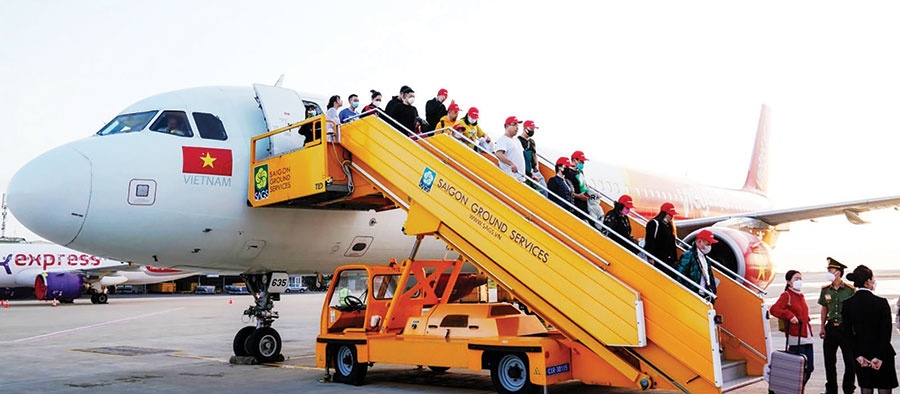Airfare ceiling needs a lift
In late February, the Civil Aviation Authority of Vietnam (CAAV) underlined the need to adjust the price ceiling for passenger transport services on domestic routes, via a dispatch to the Ministry of Transport (MoT).
 |
According to the CAAV, the maximum price specified in Circular No.17/2019/TT-BGTVT relates to when the price of Jet A-1 fuel fetched $57 per barrel in 2015. However, the price, which has been the main parameter forming the price for transport services on domestic routes, has changed continuously over the past seven years.
The pressure to loosen the ceiling price bracket is considerable, as the average price of the same fuel in Asia reached $139 per barrel in 2022, according to the International Air Transport Association.
Assuming fuel cost accounts for about 40 per cent of total costs and other cost factors do not change, with the fluctuation of the Jet A-1 price and USD-VND exchange rate, the fuel cost of airlines in December 2022 had surged by as much as 80 per cent compared to 2015, pushing up total costs by around a third.
As such, the CAAV believes the current maximum passenger transport service rate on domestic routes as specified in Circular 17 is no longer appropriate, with a need to adjust the bracket to create favourable conditions. “The proposal of Vietnam Airlines to adjust this for domestic passenger transportation services to the level prescribed in 2014 is reasonable, to equal an average increase of 3.75 per cent compared to the current price bracket,” said CAAV deputy head Pham Van Hao.
At a seminar organised by the Vietnam Aviation Business Association on February 4, the three largest performers in the aviation industry – Vietnam Airlines, Vietjet, and Bamboo Airways – all stressed the need to revise the current fare bracket to match the market's development.
“For the past five years, we annually ask authorities to consider waiving the ceiling price, but the proposal has not been dealt and with the current fare bracket, airlines have almost no profit on domestic routes,” said Trinh Ngoc Thanh, deputy general director of Vietnam Airlines.
According to Vietjet's deputy CEO Ho Ngoc Yen Phuong, while the average ticket price globally has increased by more than half, domestic fares are unchanged. Phuong said airlines were not allowed to apply the fuel surcharge mechanism, even though the price of jet fuel has increased sharply in recent years.
Aside from fuel, other input costs such as aircraft rental costs, exchange rates, and labour cost have all increased, for which local airlines couldn’t balance revenue and expenditure. Luong Hoai Nam, a member of the Vietnam Tourism Advisory Board, said that keeping the ceiling on domestic airfares had hampered the development of the domestic aviation industry and should be abandoned as soon as possible, especially when the domestic market was no longer a monopoly, with five airlines jointly operating, including two at a low-cost model.
The CAAV said that in the long term, in the face of air transport market development and competition between airlines, it was appropriate to remove regulations on the price bracket for services on domestic routes. However, it requires a roadmap to gradually remove regulations.
“In the immediate period, the MoT has a written agreement with the Ministry of Finance related to the amended draft Law on Prices on changing the price bracket regulation. The amendment of the civil aviation law will ensure compatibility with the provisions of the amended draft,” said the CAAV.
In light of Article 116 of the Law on Civil Aviation 2014, airlines have the right to decide the price of domestic air transportation services according to the ceiling price bracket set by the MoT, and then make declarations to that body.
To match the operation of the airlines as well as ensure passenger interests, the ministries of finance and transport have set regulations on the maximum price for domestic passenger services.
Currently, in Asia, besides Vietnam, only China and Indonesia are applying regulations on domestic transport service rates.
Dr. Nuno F. Ribeiro - Deputy senior programme manager Tourism and Hospitality Management, RMIT Vietnam The outlook for the rest of 2023 is cautiously optimistic. A flurry of high-profile media exposure and a variety of international travel awards in 2022 may bring the needed turnaround. Optimistic projections point towards around 10 million international arrivals, with most international tourists coming from the likes of South Korea, Japan, the United States, and several EU countries. However, Vietnam will also have to contend with competition from neighbouring tourism markets such as Thailand, Singapore, Indonesia, and Malaysia, which were faster in removing pandemic restrictions and already benefit from less stringent visa and arrival procedures. |
What the stars mean:
★ Poor ★ ★ Promising ★★★ Good ★★★★ Very good ★★★★★ Exceptional
Related Contents
Latest News
More News
- Visa data highlights five key payment and travel trends in Vietnam for 2026 (January 14, 2026 | 10:42)
- New Year tourism receipts top $40m in key cities (January 06, 2026 | 08:36)
- Vietnamese passport climbs on global ranking (December 16, 2025 | 08:00)
- Manila becomes a new check-in destination for Vietnamese youth (December 11, 2025 | 18:07)
- Vietjet launches mega year-end ticket promotion (December 10, 2025 | 11:33)
- Dalat leads Vietnam’s 2025 search trends (December 09, 2025 | 13:44)
- Vietnam welcomes record wave of international visitors (December 09, 2025 | 13:43)
- Vietjet launches daily Manila flights to celebrate year-end festive peak season (December 05, 2025 | 13:47)
- The destinations powering Vietnam’s festive season travel demand (December 04, 2025 | 18:33)
- Vietnam named among the world’s most exciting winter destinations (December 04, 2025 | 15:10)


 Tag:
Tag:




















 Mobile Version
Mobile Version